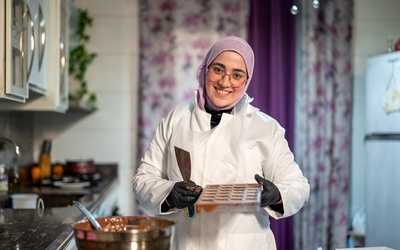One in five people in Lebanon is aged between 10 and 24 years – that’s around 30% of the population in the country. Young people in MENA are positive, hopeful that their reality will change and keen to engage positively to change that reality. The region has an opportunity to reap a demographic dividend.
Yet youth unemployment in the MENA region is the highest in the world, with 29.4% in Northern Africa and 24.7% in the Arab States. In Lebanon, 34% of the youth are unemployed. Girls bear a double burden; restricted by their age, but also by gender norms.
UNICEF, funded by the government of Germany through the German Development Bank KfW, set about establishing an innovative programme aimed at giving training and work to thousands of Lebanon’s youth, and boosted the nation’s fresh water supplies at the same time.
Promotive or transformative social protection measures, which aim to provide greater access to economic opportunities, boost livelihoods and bring about productivity gains. These include micro-credit systems, cash for work programmes and employment guarantee schemes. Due to high youth unemployment, increasingly young people seek work in the informal market. Protecting them from hazardous conditions, requires enforcement of protective labour market policies and standards for occupational safety.
In May 2019, funded by the government of Germany through the German Development Bank KfW and in partnership with national NGOs LOST, ANERA and LRC, UNICEF Lebanon’s Adolescent and Youth Programme expanded its skills training and employment support service component through a pioneering Cash 4 Work (C4W) programme in recognition of the challenges faced by today’s youth.
Aimed at providing training and work to 3,000 Lebanese and non-Lebanese and youth in the Water, Sanitation and Hygiene (WASH) and construction sectors; the programme would ultimately refer them to paid jobs or C4W opportunities with the WASH construction companies.
By March 2020, this programme had trained and referred 2,358 youth to the UNICEF’s Water, Sanitation and Hygiene (WASH) section, and had employed 1,419 youths. Involved in the rehabilitation of seventeen springs and the construction of thirty-three reservoirs, each beneficiary was provided with a minimum of 40 days paid work, with some periods extended, and for others the offer of full-time work awaited at the end of their C4W programme.
An additional 2,573 youth were trained on construction and WASH skills- all of whom were unemployed, and many of whom had never worked before at all. All 2,573 were then provided with income generation opportunities through community improvement activities consisting of work in solid waste management, construction and rehabilitation of poor households.
Alongside the personal benefit of receiving cash for work, the youth have learned valuable skills. Unskilled laborers on entry, forty days later many left as skilled construction workers.
Countless are the examples of positive bridges of social cohesion built amongst groups that would not, in their regular lives, have an opportunity to meet. Lebanese, Palestinians, Syrian refugees – they often view each other with mistrust, based largely of misconceptions and misunderstandings.
On site, as part of UNICEF’s government of Germany through the German Development Bank KfW funded C4W and WASH programmes, diverse youth have socialised readily and developed shared activities, as well as bonded through teamwork and a shared goal of the successful delivery of their projects.
For some, the experience was profound. Sarkis, a 21-year-old Lebanese unemployed business management graduate, “It was great to everyone here cooperating alongside others from different parts of the country and of different nationalities. It is clear to anyone who saw what happened here that, with the right attitude and where open minds work together, everything is possible. For us now, all people are the same – there must be no discrimination on nationality, gender, nor ability”.
Rouya, also 21, and a graduate of fine arts, found the challenge character-building. Put in charge of a group of male construction workers, her early days were difficult. However, “I’ve proved myself to them. The guys respect me now,” she says. Rouya was one of the youth offered a permanent job by site construction company Al Oula.
As the programme continues with the rehabilitation of deprived households – with a major focus on WASH facilities and connections, as well as neighbourhood upgrades and rehabilitation, electricity work in Burj el Barajneh, and construction work within many of the country’s municipalities, so the individual stories of success and achievement continue to grow.
Together with their national partners, and funded by the government of Germany through the German Development Bank KfW, UNICEF’s Adolescent and Youth Programme continues to expand its skills training and employment support service component though a highly successful Cash 4 Work programme, and is providing a positive change in the aspirations of today’s challenged youth in Lebanon. By empowering the country’s youth, UNICEF is helping turn the problem-owner into the problem-solver.








